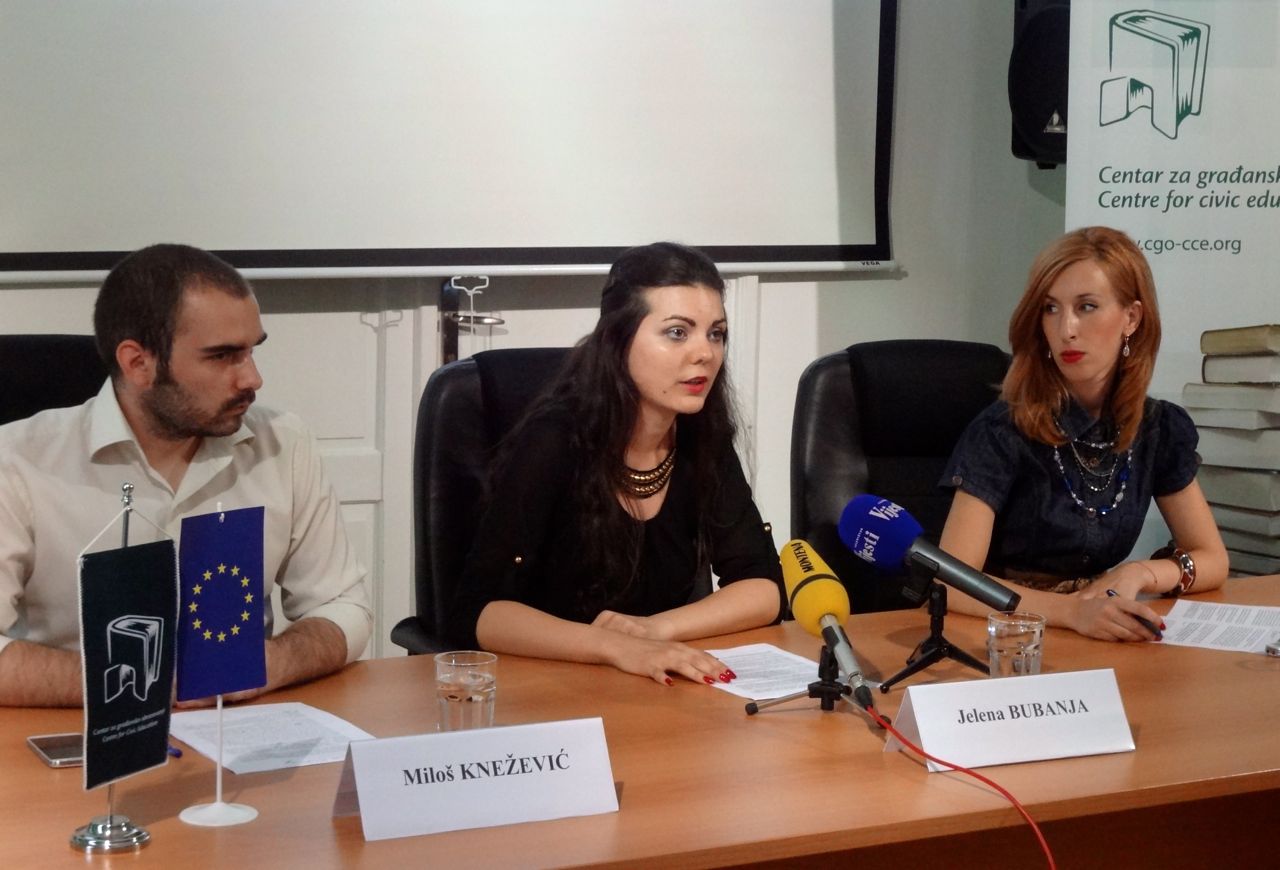Centre for Civic Education (CCE) organized today a press conference presenting policy paper: Youth participation – more than a catchword?
The policy study was developed as a result of the project under the same name, which was funded by European Commission through the Youth in Action programme, and which in previous six months was implemented by five countries in the region where two of them are EU member states – Croatia and Slovenia, and three are candidate countries – Montenegro, Serbia and FYR Macedonia. The project was conducted by: Centre for Civic Education (CCE), Podgorica, Montenegro; Western Balkans Institute (WEBIN) Belgrade, Serbia; Serbian Youth Umbrella Association (KOMS), Belgrade, Serbia; Croatian Youth Network (MMH), Zagreb, Croatia; Youth Council Slovenia (MMS), Ljubljana, Slovenia; Coalition of Youth Organizations (SEGA), Prilep, FYR Macedonia. The aim of the project, within which this conference was the final activity, was strengthening of capacity and knowledge building of national youth councils from the EU member states and candidate countries to participate in creation of practical policies i.e. in preparation of national youth reports.
The speakers at the conference were Jelena Bubanja, Youth Sector Coordinator in West Balkans Institute and Miloš Knežević, CCE Youth Group Coordinator.
Jelena Bubanja emphasized that national youth reports should reflect improvement in implementation of youth strategies thus contributing to the improvement of position of youth in eight areas, as follows: 1) education; 2) self-employment; 3) quality of life; 4) health and prevention; 5) youth participation; 6) informing youth; 7) culture; 8) youth work in community. “Therefore, it is necessary that in the assessment of this improvement, all stakeholders – especially youth, youth organizations and organizations for youth – take part in in the process of drafting of National Youth Report. In that manner, the objective picture will be achieved, based on data collected directly from the target group”, she added. She estimated that the necessity for inclusion of all stakeholders refers to all cycles and phases of report preparation: from designing process to research, examination of conditions, data collecting and its interpretation, participation in work groups and teams up to the organizing of wide consultative process and adoption of final text of the report. “However, in order to ensure participation of youth in the process of report preparation from local to national level – bottom-up approach – it is important to inform and educate young people about the process of report preparation. In that manner, they would acquire knowledge and skills for the best use of the opportunity of participating in this process”, Bubanja stressed.
Miloš Knežević, CCE Youth Group Coordinator, presented key findings and recommendations included in the regional policy study about youth participation and modalities of their involvement in the process of design of national youth reports. At the very beginning, he expressed concern about the data that “more than two thirds of youth respondents, precisely 69% did not know to cite any institution or organization in Montenegro that deals with youth. The most frequently mentioned, by every tenth respondent, are non-governmental organizations. Causes for this situation are not and should not be sought in youth, but in other factors that are directly or indirectly affecting them”. Knežević stated that youth in Montenegro is not familiar with phrases civic activism and social participation: “while every fourth respondent states that s/he knows what civic activism means, the same goes for every fifth respondent when it comes to social participation. In accordance with that comes the attitude that the youth do not have possibilities to affect state authority decisions. Concerning the real situation in Montenegro in practical participation of youth in decision-making process, research indicates that the highest percentage (33%) finds that they have been manipulated. Also, 21% of respondents said that the minimal efforts are done in order to offer equal opportunities to young people as those that the adults have, and even 20% of respondents believe that youth represent only a decoration of organized activities and that they are not participants in the real sense. In other words, when you take a look at the real situation, youth in Montenegro realize that they do not participate actively in social processes and decisions making of importance for the society, but that they are there just like that, or that they have been manipulated”, he concluded. “Therefore, we appeal for faster adoption of Law on Youth which would legally define implementation of National Youth Action Plan and Local Youth Action Plan, as well as the forms of participation of youth and youth organizing, youth work and support to youth on local and national level”, Knežević said.
National Youth Report for three-year period is a mechanism of monitoring of progress made by the EU member states and candidates for EU membership in implementation of European Youth Strategy for the period of 2010-2018. National youth reports are published in summary report under the name European Youth Report for Three-Year Period. Aiming to improve overall position of youth in political and social system, youth umbrella association, their members and stakeholders from countries in the region recognized the importance of involving youth in preparation of National Youth Reports for 2015. Thus, the aim of this policy paper is to advocate involvement of youth and their organizations in the process of preparation of national youth reports in Serbia, Croatia, Slovenia, FYR Macedonia and Montenegro in 2015.
Svetlana Pešić, Programme Associate

